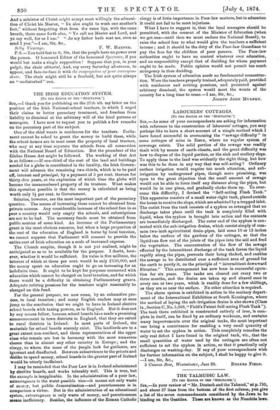THE IRISH EDUCATION SYSTEM.
(TO THE EDITOR OF THE "SPECTATOR.")
SIR,—I thank you for publishing on the 27th ult. my letter on the position of the Irish National-school teachers, in which I urged
their claims to better pecuniary treatment, and freedom from - liability to dismissal at the arbitrary will of the local patrons or managers. I have now to request you to publish a few remarks on the pecuniary part of the subject.
One of the chief wants is residences for the teachers. Parlia- ment cannot be asked to grant the money to build these, while the school-houses are in most cases the property of local trustees, who may at any time separate the schools from all connection with the National Board of Education. But the precedent of the Glebes House Act might be followed. The working of that Act is as follows:—If one-third of the cost of the land and buildings needed for a glebe is contributed in the locality, the Irish Govern- ment will advance the remaining two-thirds, which is to be paid off, interest and principal, by a payment of 5 per cent, thereon for thirty-five years, at the expiration of which time the glebe will become the unencumbered property of its trustees. What makes this operation possible is that the money is calculated as being worth only 3f per cent. to Government.
Salaries, however, are the most important part of the pecuniary question. The means of increasing these cannot be obtained from private sources. Any considerable increase of the school fees in so poor a country would only empty the schools, and subscriptions are not to be had. The necessary funds must be obtained from public sources of some kind. An increase of the Parliamentary grant is the most obvious resource, but when a large proportion of the cost of the education of England is borne by local taxation, we cannot suppose that Parliament will consent to provide the entire cost of Irish education on a scale of increased expense.
The Church surplus, though it is not yet realised, might be anticipated so as to be available for the purpose. I doubt, how- ever, whether it would be sufficient. Its value is five millions, the interest of which at three per cent. would be only £150,000, and the money spent on education ought to go on increasing for an indefinite time. It ought to be kept for purposes connected with education which cannot be charged on local taxation, and for which there would be a difficulty in obtaining Parliamentary grants. Adequate retiring pensions for the teachers might reasonably be charged on this fund.
For the general purpose, we now come, by an exhaustive pro- ems, to local taxation ; and many English readers may at once jump to the conclusion that we ought to have in Ireland elective school boards with taxing powers, as in England. But it does not by any means follow, because school boards have made a promising commencement in town districts in England, that they are suited to rural districts in Ireland. In most parts of Ireland, the materials for school boards scarcely exist. The landlords are to a great extent non-resident, and those- representatives of the upper clam who remain are less in harmony with the most numerous classes than in almost any other country in Europe ; and the clergy, to whom the mass of the People look for guidance, are ignorant and disaffected. Between subservience to the priests and dislike to spend money, school boards in the greater part of Ireland would be utterly inefficient.
I may be reminded that the Poor Law is in Ireland administered by elective boards, and works tolerably well. This is true, but the example is inapplicable. In the administration of a poor law, extravagance is the worst possible vice—it means not only waste of money, but public demoralisation—and penuriousness is in comparisona virtue. But in the administration of an educational system, extravagance is only waste of money, and penuriousness means inefficiency. Besides, the influence of the Roman Catholic clergy is of little importance in Poor-law matters, but in education it could not fail to be most injurious.
What I have to suggest is, that the local managers should be permitted, with the consent of the Minister of Education (when we get one—until then we must endure the National Board), to raise the school fees to what would give the teachers a sufficient income ; and it should be the duty of the Poor-law Guardians to. pay the fees for the children of poor parents. The Poor-law authorities ought to have no control whatever over education, and no responsibility except that of deciding for whom payment ought to be made. Public opinion would not permit too much- stringency in thus deciding.
The Irish system of education needs no fundamental reconstruc- tion. Were the teachers properly trained, adequately paid, provided with residences and retiring pensions, and protected against arbitrary dismissal, the system would meet the wants of the country for a long time to come.—I am, Sir, &c.,
JOSEPH JOHN MURPHY.


































 Previous page
Previous page